Stamp Duty Payment
Registering or legalizing a document in India and several other countries involves paying stamp duty. The document in question is then stamped as proof that stamp duty has been paid, but what are the different ways to pay stamp duty?
Before we get to this, we must first address what stamp duty is.

What is stamp duty?
Stamp duty is a tax paid to state governments to register a legal document and makes up a significant portion of state revenue.
The Indian Stamp Act (1899) is the cornerstone of stamp duty and broadly describes which instruments require stamp duty payment, how stamp duty is to be paid, and when to pay stamp duty.
The stamp duty paid on various instruments is determined by the stamp laws of the state in which the instrument is registered.
What are the different types of stamp duty?
Stamps and the stamp duty for these stamps are almost interchangeable since the stamps themselves serve as proof that the requisite stamp duty has been paid.
Stamps can be broadly classified into two categories:
1.Adhesive stamps
Adhesive stamps refer to stamps stuck on to instruments after the required stamp duty has been paid. These are by far the most common stamps used and are further classified into postal and non-postal stamps.
Postal stamps are the stamps that everyone’s familiar with and are used for transactions with the post office. Non-postal stamps are typically used to register transactions with courts of law, insurance firms, foreign offices, notaries, brokers, etc.
2.Impressed stamps
Impressed stamps are stamps that are affixed, impressed, or engraved on registered instruments by an officer.
These can also refer to impressions rendered on instruments by franking machines after the requisite stamp duty is paid.
Now that we have seen the broad categories of stamps let’s delve into the various individual ways in which stamp duty can be paid.
Types of stamp duty
1. Non-Judicial Stamp Papers
These refer to traditional or non-judicial stamp paper, used for sale deeds, transfer of immovable property, affidavits, agreements, deeds, wills, etc. Non-judicial stamp paper can be purchased by visiting and purchasing stamp paper from any licensed stamp vendor.

2. e-Stamping
E-stamping is an accessible mode of stamp duty payment widely accepted in India and legal across the majority of Indian states. E-stamping involves the payment of stamp duty online, following which a unique e-stamp certificate is generated as proof for stamp duty payment. The e-stamping facility comes under the purview of SHCIL, which provides a platform for payment of online stamp duty.
E-stamping is a streamlined and quick process and generates non-judicial e-stamp paper in minutes. Verification of e-stamped documents is instant, and instruments can be stamped securely and remotely.

3. Franking
Franking involves impressing an instrument with a red mark (which includes the postage amount) through automated franking machines authorized by the government.
An officer typically franks an instrument following the payment of stamp duty, generally in cash.
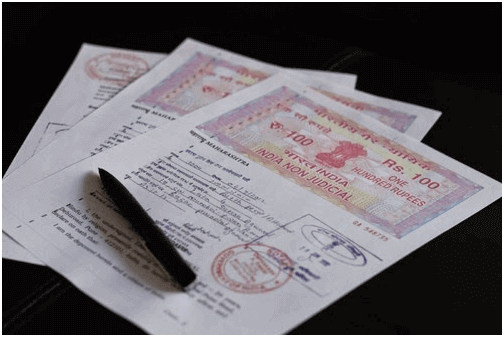
4. Notary Stamps
Notary stamps refer to stamps that are executed by a notary.
Notary stamps are usually affixed on a document by a state or central government-appointed official (usually an Executive Magistrate) to notarize the document.

5. Revenue Stamps
Revenue stamps are adhesive stamps that are used to record financial exchanges or transactions.
These stamps are used as receipts for monetary payments and are integral in collecting taxes on documents, licenses, etc
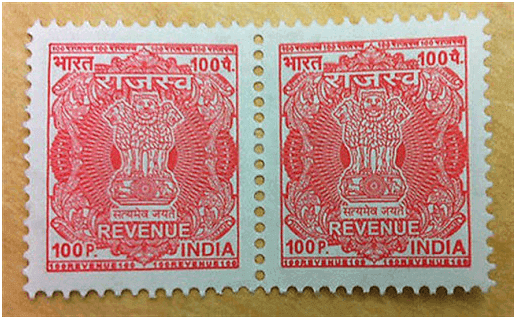
6. Hundi Paper
Hundi papers are vestiges of the document legalization process before independence. They were used when dealing with bills of exchange, promissory notes, or IOUs.
Hundi papers are revenue stamps that are pre-printed on paper and are used for credit and trade transactions. Special adhesive stamps are now actively replacing Hundi papers.
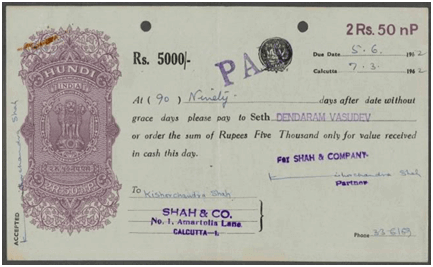
7. Court Fees Stamps
Court fee stamps are used to indicate the payment of court fees before court proceedings.
They are generally used in correspondences between the general public and government departments, including RTO offices, passport issuing authorities, the police force, etc.
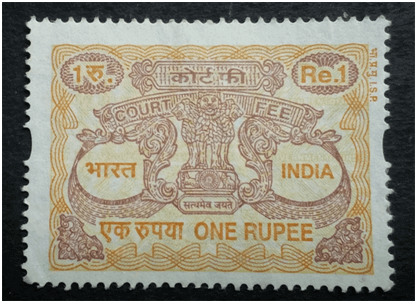
8. Judicial Stamps
Judicial stamps are a category of impressed stamps used to indicate transactions with the judiciary.
These transactions are usually dues, fines, or duty transactions in the civil and criminal courts.
Stamp duty paid without judicial stamp paper is paid under the Court Fees Act of 1870, and stamp duty paid without non-judicial stamp paper is paid under The Indian Stamp Act of 1899.
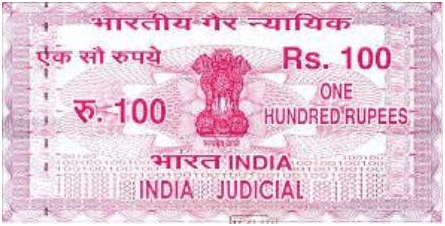
9. GRAS
GRAS (Government Receipts Accounts System) is a system dedicated to generating revenue online from the various departments of the government. GRAS can be used to pay stamp duty, VAT, CST, penalties, etc. by generating an e-challan.
GRAS requires users to fill in details on the official GRAS website, generate an e-challan, and pay the requisite fees through a NetBanking account with a select list of banks. The registration fees can also be paid over the counter at a few banks.
10.eSBTR
eSBTR (Electronic Secure Bank Treasury Receipt) is a mode of stamp duty payment involving stamp duty payment at designated banks.
Following stamp duty payment, the details of the transaction are entered into an online database, and an e-challan is generated. This e-challan can be used as proof of stamp duty payment.
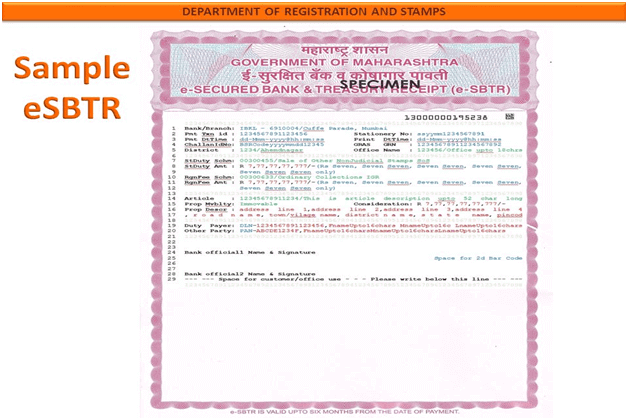
How can you pay stamp duty?
Physical stamp and manual stamp duty payments are slow and result in massive TAT for businesses.
Digital stamping, on the other hand, allows for real-time online stamp duty payment and is also verifiable online.
SignDesk’s flagship stamp duty solution is preferred by 7 out of 10 businesses and has been shown to reduce TAT by nearly 99%. Our digital stamping product is backed by the best legal experts and allows you to track your document status at all times.
Digital stamping provides businesses with all the benefits of automation, including reduced costs and optimized workflow, while allowing them to register documents online quickly.
Book a demo with us now and see how online stamp duty payment can boost your efficiency.
